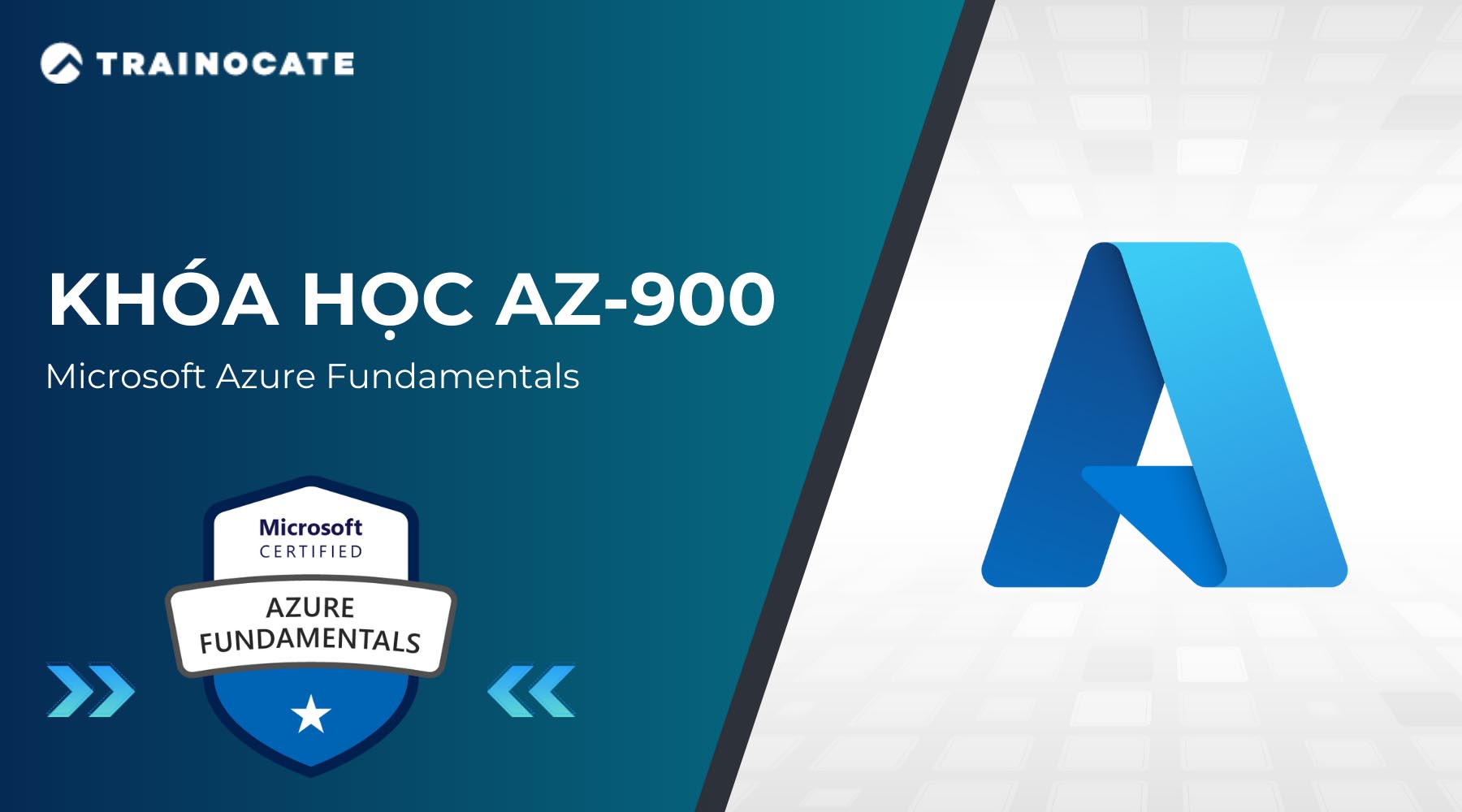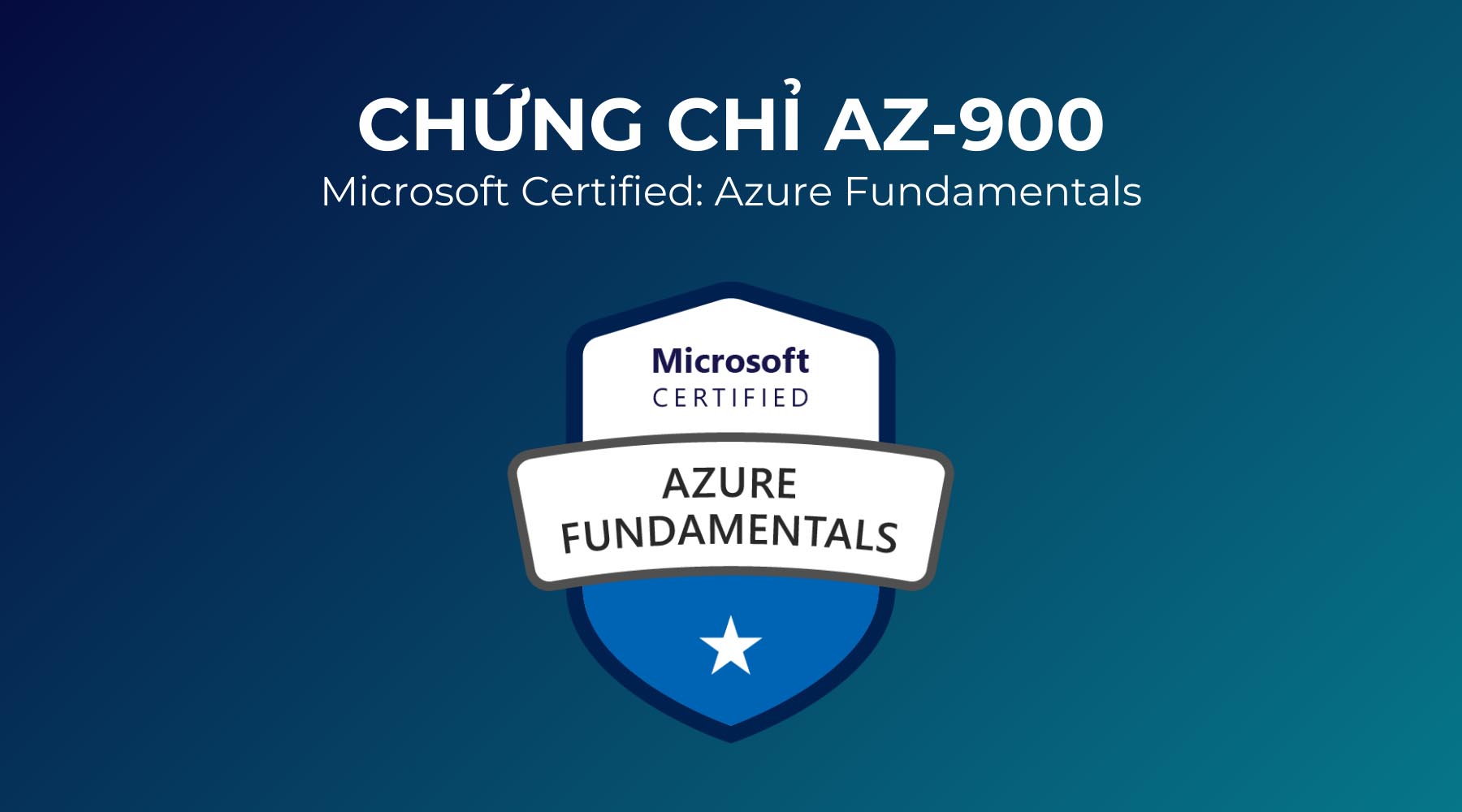AZ-900: Microsoft Azure Fundamentals
Tổng quan về khóa học AZ-900 Azure Fundamentals
Khóa đào tạo chứng chỉ AZ-900 Microsoft Azure Fundamentals kéo dài một ngày này sẽ cung cấp kiến thức cơ bản về các khái niệm Azure; dịch vụ Azure cốt lõi; giải pháp cốt lõi và công cụ quản lý; an ninh chung và an ninh mạng; các tính năng quản trị, quyền riêng tư và tuân thủ; Quản lý chi phí Azure và các thỏa thuận mức dịch vụ.
Khóa học cũng là nền tảng kiến thức giúp học viên chuẩn bị cho kỳ thi AZ-900 Exam và chứng chỉ AZ-900 Microsoft Certified: Azure Fundamentals.

Mục tiêu khóa học
Sau khi hoàn thành khóa học Azure 900 này, học viên sẽ có thể:
-
Hiểu những kiến thức cơ bản về điện toán đám mây và Azure, cũng như cách bắt đầu với đăng ký và tài khoản của Azure.
-
Mô tả những lợi thế của việc sử dụng các dịch vụ điện toán đám mây, học cách phân biệt giữa các danh mục và loại điện toán đám mây, và ho
-
để kiểm tra các khái niệm, tài nguyên và thuật ngữ khác nhau cần thiết để làm việc với kiến trúc Azure.
-
Phác thảo các dịch vụ cốt lõi có sẵn với Microsoft Azure.
-
Thảo luận về các giải pháp cốt lõi bao gồm một loạt các công cụ và dịch vụ từ Microsoft Azure.
-
Mô tả các tính năng bảo mật chung và bảo mật mạng cũng như cách bạn có thể sử dụng các dịch vụ Azure khác nhau để giúp đảm bảo rằng tài nguyên đám mây của bạn an toàn, bảo mật và đáng tin cậy.
-
Thảo luận về các tính năng nhận dạng, quản trị, quyền riêng tư và tuân thủ cũng như cách Azure có thể giúp bạn truy cập an toàn vào tài nguyên đám mây, ý nghĩa của việc xây dựng chiến lược quản trị đám mây và cách Azure tuân thủ các tiêu chuẩn tuân thủ và quy định chung.
-
Thảo luận về các yếu tố ảnh hưởng đến chi phí, các công cụ bạn có thể sử dụng để giúp ước tính và quản lý chi tiêu trên đám mây của mình cũng như cách các thỏa thuận cấp dịch vụ (SLA) của Azure có thể tác động đến các quyết định thiết kế ứng dụng của bạn.
Đối tượng học viên
Khóa học này phù hợp với nhân sự IT mới bắt đầu làm việc với Azure. Học viên muốn tìm hiểu về các dịch vụ của Microsoft Azure và thực hành trực tiếp với sản phẩm. Khóa học chủ yếu sử dụng Azure portal để tạo dịch vụ và không yêu cầu kỹ năng scripting.
Không có yêu cầu kiến thức cho khóa học AZ-900 Azure Fundamentals, tuy nhiên nếu bạn có kiến thức chung về IT và Cloud sẽ giúp việc học tập dễ dàng hơn
Nội dung khóa học AZ-900 Azure Fundamentals
Module 1: Describe cloud computing
This module introduces you to cloud computing. It covers cloud concepts, deployment models, and understanding shared responsibility in the cloud.
- Define cloud computing.
- Describe the shared responsibility model.
- Define cloud models, including public, private, and hybrid.
- Identify appropriate use cases for each cloud model.
- Describe the consumption-based model.
- Compare cloud pricing models.
Module 2: Describe the benefits of using cloud services
This module introduces you to the benefits cloud computing can offer you or your organization.
- Describe the benefits of high availability and scalability in the cloud.
- Describe the benefits of reliability and predictability in the cloud.
- Describe the benefits of security and governance in the cloud.
- Describe the benefits of manageability in the cloud.
Module 3: Describe cloud service types
This module covers the different cloud service types and shares some use cases and benefits aligned with each service type.
- Describe Infrastructure as a Service (IaaS).
- Describe Platform as a Service (PaaS).
- Describe Software as a Service (SaaS).
- Identify appropriate use cases for each cloud service (IaaS, PaaS, SaaS).
Module 4: Describe the core architectural components of Azure
This module explains the basic infrastructure components of Microsoft Azure. You’ll learn about the physical infrastructure, and how resources are managed, and have a chance to create an Azure resource.
- Describe Azure regions, region pairs, and sovereign regions
- Describe Availability Zones
- Describe Azure datacenters
- Describe Azure resources and Resource Groups
- Describe subscriptions
- Describe management groups
- Describe the hierarchy of resource groups, subscriptions, and management groups
Module 5: Describe Azure compute and networking services
This module focuses on some of the computer services and networking services available within Azure.
- Compare compute types, including container instances, virtual machines, and functions
- Describe virtual machine (VM) options, including VMs, virtual machine scale sets, availability sets, Azure Virtual Desktop
- Describe resources required for virtual machines
- Describe application hosting options, including Azure Web Apps, containers, and virtual machines
- Describe virtual networking, including the purpose of Azure Virtual Networks, Azure virtual subnets, peering, Azure DNS, VPN Gateway, and ExpressRoute
- Define public and private endpoints
Module 6: Describe Azure storage services
This module introduces you to storage in Azure, including different types of storage and how a distributed infrastructure can make your data more resilient.
- Compare Azure storage services
- Describe storage tiers
- Describe redundancy options
- Describe storage account options and storage types
- Identify options for moving files, including AzCopy, Azure Storage Explorer, and Azure File Sync
- Describe migration options, including Azure Migrate and Azure Data Box
Module 7: Describe Azure identity, access, and security
This module covers some of the authorization and authentication methods available with Azure.
- Describe directory services in Azure, including Azure Active Directory (AD) and Azure AD DS
- Describe authentication methods in Azure, including single sign-on (SSO), multifactor authentication (MFA), and passwordless
- Describe external identities and guest access in Azure
- Describe Azure AD Conditional Access
- Describe Azure Role Based Access Control (RBAC)
- Describe the concept of Zero Trust
- Describe the purpose of the defense in depth model
- Describe the purpose of Microsoft Defender for Cloud
Module 8: Describe cost management in Azure
This module explores methods to estimate, track, and manage costs in Azure.
- Describe factors that can affect costs in Azure
- Compare the Pricing calculator and Total Cost of Ownership (TCO) calculator
- Describe Azure Cost Management Tool
- Describe the purpose of tags
Module 9: Describe features and tools in Azure for governance and compliance
This module introduces you to tools that can help with governance and compliance within Azure.
- Describe the purpose of Azure Blueprints
- Describe the purpose of Azure Policy
- Describe the purpose of resource locks
- Describe the purpose of the Service Trust portal
Module 10: Describe features and tools for managing and deploying Azure resources
This module covers tools that help you manage your Azure and on-premises resources.
- Describe Azure portal
- Describe Azure Cloud Shell, including Azure CLI and Azure PowerShell
- Describe the purpose of Azure Arc
- Describe Azure Resource Manager (ARM) and Azure ARM templates
Module 11: Describe monitoring tools in Azure
This module covers tools that you can use to monitor your Azure environment.
- Describe the purpose of Azure Advisor
- Describe Azure Service Health
- Describe Azure Monitor, including Azure Log Analytics, Azure Monitor Alerts, and Application Insights

Đăng ký khóa học AZ-900 Azure Fundamentals
Bạn có thể đăng ký khóa học AZ-900 tại Trainocate Vietnam - đối tác đào tạo ủy quyền của Microsoft. Đồng thời Trainocate Vietnam cũng là trung tâm khảo thí quốc tế ủy quyển bởi Pearson VUE, bạn có thể đăng ký thi lấy chứng chỉ AZ-900 ngay tại Trainocate sau khi hoàn thành khóa học.
Để được tư vấn chi tiết về khóa đào tạo chứng chỉ AZ-900 Azure Fundamentals hoặc các khóa học chứng chỉ chính hãng Microsoft khác, hãy liên hệ ngay với Trainocate Vietnam qua hotline hoặc điền vào biểu mẫu đăng ký.
Trainocate Vietnam - Đối tác đào tạo ủy quyền của hơn 30 tập đoàn công nghệ hàng đầu thế giới!
Lịch khai giảng
Form đăng ký
Các khóa đào tạo Microsoft khác
Đăng ký tư vấn
cùng đội ngũ chuyên gia Trainocate!!
Bản quyền thuộc về Trainocate Việt Nam



